
Quick Summary: Team collaboration has evolved from coordination to intelligence. According to a 2024 McKinsey survey, companies that prioritize cross-functional collaboration achieve 35% higher project success rates and 20% faster decision cycles. Yet, even well-aligned teams face delays when collaboration lacks structure, foresight, or visibility.
This article explores how team collaboration in project management has become the foundation of delivery excellence—how predictive intelligence strengthens it with early risk detection, sentiment insights, and guided decisions, and why TrueProject serves as the intelligence layer that turns collaboration into confident, measurable outcomes.
Why Team Collaboration Matters More Than Ever in Project Management
Project Management
Modern projects succeed—or fail—on the strength of their collaboration. The era of individual performance metrics has given way to shared accountability, where outcomes depend on how effectively teams communicate, decide, and adapt.
The New Urgency
Remote and hybrid work have multiplied the friction points. A 2023 Atlassian report revealed that 46% of project teams cite communication gaps as their biggest cause of missed milestones. Meanwhile, complex portfolios spanning digital transformation, AI adoption, and modernization require cross-functional cooperation at a scale never seen before.
Collaboration isn’t just about working together—it’s about synchronizing intent, information, and insight. That’s where traditional collaboration tools fall short. They connect people, but they don’t interpret what’s happening inside the collaboration: early signs of misalignment, stakeholder friction, or confidence drift.
From Communication to Predictive Collaboration
Today’s leading PMOs and CIOs are redefining collaboration not as a channel but as a system of signals. They use predictive intelligence to spot trends across engagement, progress, and sentiment—well before those signals translate into risk.
As a result, collaboration becomes proactive, not reactive. Instead of post-mortems after missed deliverables, predictive insights surface friction early, helping leaders course-correct while there’s still time to recover value.
To make this shift, organizations must first baseline their current collaboration health—understanding where conversations slow, tasks stall, and confidence weakens.
Take a TrueProject Snapshot → get an instant read on early-warning signals in team collaboration, stakeholder sentiment, and delivery rhythm before issues escalate.
The Architecture of Effective Team Collaboration in Project Management
True collaboration doesn’t emerge from tools—it’s built on trust, transparency, and structure. In project environments, that structure can be mapped to three collaborative dimensions: purpose, process, and people (as outlined by New Leaders, 2024).
1. Purpose Alignment: Shared Vision, Not Shared Documents
A team that knows why it’s collaborating performs measurably better. Purpose alignment ensures every team member, from PMO to engineering to client-side stakeholders, understands the project’s “why” and “what good looks like.”
FranklinCovey’s 2024 research shows that teams with shared purpose outperform misaligned ones by 48% in on-time delivery.
Predictive intelligence reinforces this alignment by monitoring sentiment shifts in team discussions and project updates. When confidence or clarity starts slipping, the system surfaces it as a signal—long before it becomes a morale or milestone issue.
2. Process Design: Collaboration That Scales
The best teams collaborate through clarity of process, not personality. Frameworks like PRINCE2 or Agile provide rhythm, but predictive tools now elevate them further—turning progress and communication data into foresight.
For example, if backlog discussions stall or handoff queues lengthen, predictive indicators can alert leaders that collaboration efficiency is declining—even if work appears to be progressing.
This structured visibility allows teams to adapt processes dynamically. It also gives PMOs confidence that collaboration is delivering measurable outcomes—not just activity.
Seeing collaboration through this data-driven lens often changes how leaders approach governance and accountability.
Request a TrueProject demo → see how predictive collaboration insights reveal hidden risks, strengthen cross-functional visibility, and sustain delivery confidence.
3. People Dynamics: The Core of Predictive Collaboration
No framework or dashboard replaces human dynamics. Collaboration thrives where empathy meets evidence—where managers not only encourage open communication but also act on the signals it reveals.
Predictive systems make that possible by interpreting stakeholder sentiment and surfacing unseen friction points. For example, if engagement metrics drop or decision latency increases, predictive analytics can highlight patterns tied to specific teams or milestones.
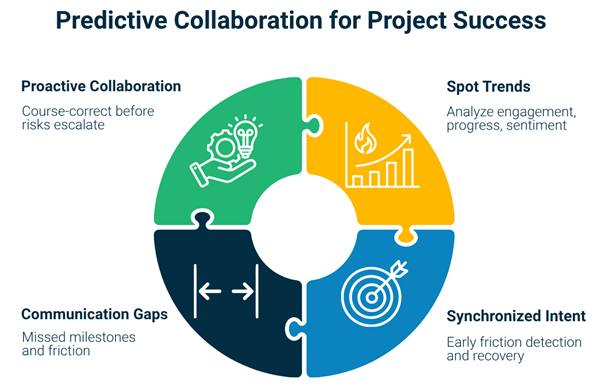
The outcome? Conversations that once happened after project problems now happen before they cause impact. This predictive layer transforms collaboration from “what went wrong” to “what could go wrong next—and who can fix it.”
Building collaboration is one thing—sustaining it under project pressure is another. The next section explores how organizations can implement a structured collaboration framework that scales across teams, projects, and portfolios—without adding bureaucracy or slowing delivery.
Implementing Team Collaboration in Project Management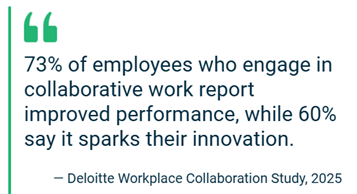
Creating a collaborative culture requires design, not luck. In project management, collaboration must operate like an ecosystem—connected, measurable, and self-correcting.
Step 1: Map Collaboration Touchpoints
Every project generates dozens of interaction nodes: planning meetings, sprint reviews, stakeholder updates, handoffs, and retrospectives. Map these points, then identify where communication delays or decision bottlenecks occur.
Predictive platforms can then monitor these nodes in real time—tracking sentiment, response cadence, and variance from expected timelines. The result is a living map of collaboration health.
Step 2: Establish Shared Visibility
Transparency removes the friction of hidden progress. A unified workspace—whether in Jira, Notion, or TrueProject dashboards—keeps every team aligned on the same truths.
Teams with transparent metrics see 19% higher trust scores and 23% lower rework rates, according to PMI’s 2024 Pulse of the Profession report. Predictive dashboards extend that trust by contextualizing what the data means: not just current status, but where the project is trending.
Step 3: Define Decision Protocols
Ambiguity kills collaboration faster than conflict. Establish clear decision ownership and escalation paths. Predictive indicators can then flag when decision latency increases—so leaders can intervene early, not post-deadline.
Step 4: Close the Loop
Great collaboration has feedback loops built-in. Use retrospectives not only to discuss performance but to recalibrate predictive thresholds. Over time, collaboration becomes a self-learning mechanism—one that improves accuracy with every project cycle.
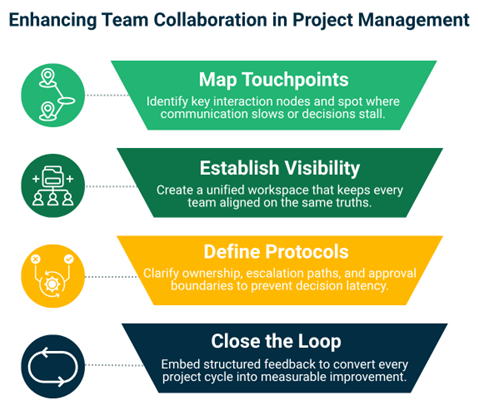
Leaders often ask where to begin this transformation. The key is starting small—assessing one team, one flow, or one project—to see where collaboration signals are already visible and where blind spots exist.
Schedule a discussion → explore how your teams can baseline collaboration health, surface unseen friction points, and strengthen decision clarity across projects.
Overcoming Challenges and Guardrails in Team Collaboration
Even with strong intent, collaboration often stalls due to hidden inhibitors—siloed accountability, unclear priorities, or cultural resistance.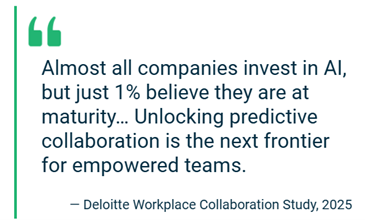
The Cultural Challenge
Most collaboration breakdowns are cultural, not technical. Teams may fear transparency if past accountability models punished openness. Predictive intelligence addresses this by making visibility neutral—it shows system signals, not personal failures. When teams see metrics framed around health rather than fault, participation rises, and data accuracy improves.
The Process Paradox
Over-structuring collaboration can backfire. Too many meetings, tools, or metrics create noise. The guardrail is simplicity: use predictive alerts as quiet signals that trigger meaningful conversations, not dashboards for dashboards’ sake.
When a queue ages beyond the service-level threshold or stakeholder sentiment dips, teams know exactly when and where to act.
The Leadership Lens
Leaders must evolve from coordinators to signal interpreters. They need to ask:
- Where are collaboration signals bending?
- Which teams show early drift in confidence or delivery rhythm?
- What countermeasures can be triggered automatically?
Predictive platforms like TrueProject give leaders a factual basis for those questions, turning subjective impressions into actionable foresight.
Organizations ready to operationalize this signal-driven leadership often begin by aligning tool ecosystems and governance models.
Watch demo to see how TrueProject align your collaboration frameworks with predictive signals and governance models that accelerate delivery without adding complexity.
The Human and Predictive Layers of Collaboration
True collaboration lives at the intersection of people and data. Predictive intelligence doesn’t replace human judgment—it augments it, giving leaders context and confidence.
Emotional Intelligence Meets Data Intelligence
Empathy remains the foundation of collaboration. Predictive analytics simply adds clarity by revealing what’s not said in meetings—waning sentiment, unspoken tension, or quiet over-commitment.
Gartner’s 2024 report on Future of Work Coordination found that teams blending analytics with emotional intelligence improved stakeholder satisfaction by 29% within two quarters.
 By combining human awareness with predictive indicators, managers can distinguish between temporary dips and systemic misalignment—addressing issues with precision instead of assumptions.
By combining human awareness with predictive indicators, managers can distinguish between temporary dips and systemic misalignment—addressing issues with precision instead of assumptions.
Cross-Functional Synchronization
Modern projects weave together technology, operations, finance, and customer teams. Predictive collaboration layers unify them through a shared rhythm of data and dialogue.
When every team interprets performance through the same predictive lens—variance, sentiment, throughput—alignment happens naturally. The project narrative shifts from status reports to shared foresight.
Continuous Learning Loops
The most mature organizations treat every project as a dataset for improvement. Predictive systems analyze past collaboration to forecast future risks, guiding playbooks for upcoming initiatives. Over time, collaboration maturity becomes measurable: fewer unplanned escalations, smoother handoffs, and visible confidence in delivery.
Having established the human and predictive foundations, the next step is to understand how collaboration itself is evolving—toward adaptive, AI-assisted ecosystems that anticipate needs, not just report outcomes.
The Future of Team Collaboration in Project Management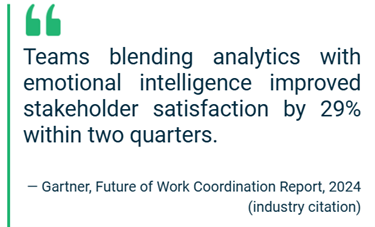
Team collaboration is no longer a static competency—it’s a living capability that adapts with technology, culture, and predictive intelligence. The next wave of collaboration will center on adaptive ecosystems, AI-assisted foresight, and human-machine synergy.
AI and Predictive Collaboration Ecosystems
Predictive intelligence is transforming collaboration from coordination to cognition.
Tomorrow’s project environments will not just share updates—they’ll sense patterns, forecast outcomes, and suggest interventions in real time. A 2025 Forrester projection notes that AI-enhanced collaboration tools will reduce project delivery time by up to 25% across industries by identifying inefficiencies before humans can detect them.
Predictive platforms like TrueProject already enable this by integrating data from multiple sources—tasks, communications, KPIs, and stakeholder sentiment—and converting them into forward-looking recommendations.
The result is not more meetings, but fewer surprises.
The Rise of Cognitive Collaboration
The next era will bring cognitive collaboration, where systems interpret context, not just activity. For instance, when cross-team sentiment dips or communication frequency drops in a critical phase, the system can alert the PMO with recommendations—“realign responsibilities,” “trigger a stakeholder sync,” or “review resource allocation.”
These intelligent nudges make project collaboration adaptive, evidence-based, and emotionally aware.
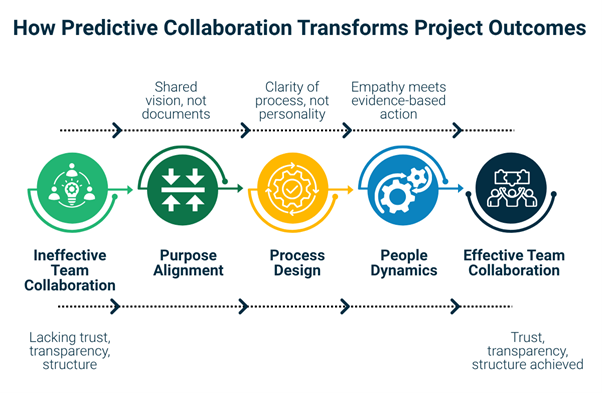
Predictive Intelligence as the Collaboration Compass
As enterprises scale, collaboration signals will be treated like KPIs. Predictive analytics will function as the compass—guiding where leadership attention is most needed.
Instead of depending solely on retrospectives or dashboards, predictive systems will proactively highlight trends such as “confidence erosion,” “decision latency,” or “queue stagnation.” This foresight ensures teams move with rhythm and purpose, not reaction and rework.
Businesses that envision collaboration as a competitive advantage—not just a communication practice—are already reshaping their governance playbooks with predictive intelligence at the center.
Conclusion
In project management, team collaboration isn’t just about connection—it’s about convergence. Convergence of purpose, process, and people. Convergence of human insight and machine intelligence. Convergence of conversation and control.
The organizations that will lead the next decade of delivery excellence are those that treat collaboration not as a soft skill, but as a strategic operating system. Predictive intelligence is what makes that system self-correcting—revealing early warnings, surfacing sentiment drift, and translating data into direction.
That’s where TrueProject fits: as the predictive intelligence layer that strengthens collaboration across every portfolio and project. It helps teams act early, govern smartly, and deliver with confidence. By translating real-time project data into foresight, TrueProject empowers leaders to anticipate risks, align teams, and sustain delivery momentum. It turns collaboration into a measurable advantage—one where insight, action, and accountability move together to ensure every project stays on track. When collaboration becomes intelligent, success stops being accidental—it becomes inevitable.
Request a TrueProject demo →experience how predictive intelligence transforms team collaboration into a repeatable, measurable advantage.
FAQs: Team Collaboration in Project Management
1) What is team collaboration in project management?
Team collaboration in project management is the structured coordination of people, processes, and data toward shared goals. It involves transparent communication, aligned decision-making, and collective accountability across cross-functional teams.
2) Why is collaboration critical to project success?
Projects thrive on interdependency. When collaboration is strong, information flows faster, risks surface earlier, and execution aligns with intent. According to PMI (2024), teams with high collaboration maturity achieve 28% fewer cost overruns and 31% faster milestone completion.
3) How does predictive intelligence enhance team collaboration?
Predictive intelligence identifies patterns—like communication slowdowns, confidence dips, or emerging risks—so teams can act before issues escalate. It turns reactive collaboration into proactive governance.
4) What are the common challenges in team collaboration?
Common challenges include communication silos, decision latency, tool overload, and resistance to transparency. Predictive systems address these by providing neutral, data-backed visibility that builds trust and accountability.
5) How can organizations measure collaboration success?
Success can be measured through throughput, cycle time, engagement sentiment, stakeholder satisfaction, and predictive signal stability. The goal isn’t just faster communication—it’s sustained alignment and measurable delivery confidence.






